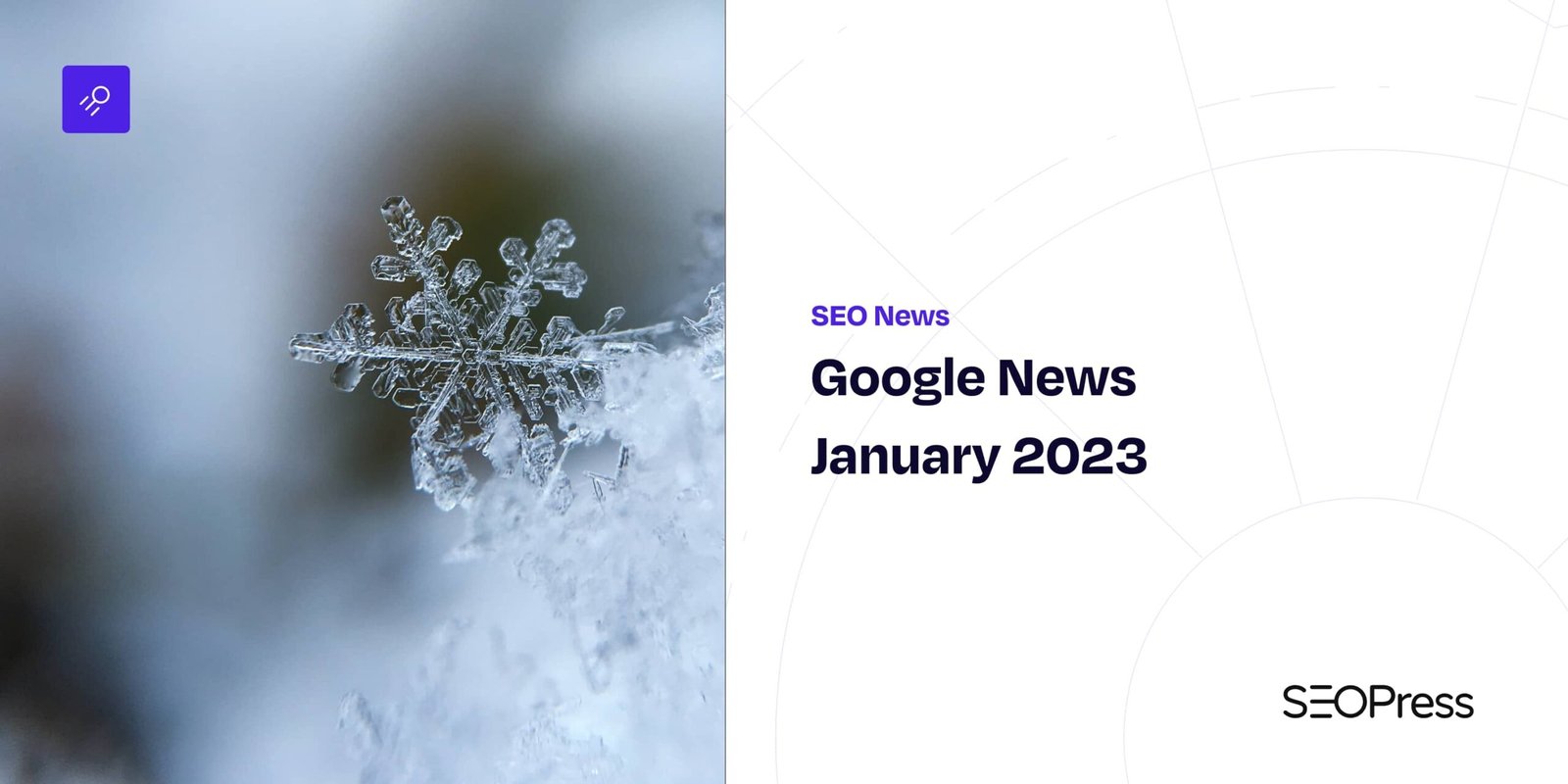The New Year started with two Google updates still rolling out and it took nearly two weeks for them to finish. A week later Google announced a round of redundancies which left the Search Relations team in fear for their jobs and saw them slowing down their production of content for website owners.
In other news, the source code for the Yandex search engine was leaked and everyone is still talking a lot about ChatGPT and the impact it could have on Google and SEO. We have been so impressed by the AI-driven language model that we have integrated OpenAI’s GPT to SEOPress! It can now use it to generate content for titles and descriptions directly in WordPress. More about this amazing new feature below.
January 12th – End of Helpful Content and Link Spam Updates
As we mentioned in December’s Google News, Google finished the year with two updates still ongoing. The Helpful Content update started on December the 6th and should have finished rolling out two weeks later according to information published in the official list of Google Search ranking updates. But it hadn’t finished before Google released the Spam Link update on December 14th. We then had two Google updates rolling-out leading into Christmas and the New Year.
On the social network Mastodon, John Mueller from Google explained that both releases were in fact slowed down over the holiday period for “safety” reasons. They were announced as being finished – again on the official list of Google Search ranking updates on January 12th.
Google search results trackers such as Rank Ranger pictured below showed that there was volatility in search results on the 5th, 6th and 7th of January and this was certainly related to one of the updates – but which one? This is the problem when two updates are released at the same time. It makes it more difficult to understand what could be affecting ranking if you see rank changes for your site’s keywords. In this case, was it the site’s content or links to it.

It is interesting to note that there was also a day of high volatility on January 14th, two days after the updates were finished. With no official update from Google we have to guess that this may also have been linked to one of the updates.
Reminder: The Helpful Content update allows Google to detect unhelpful content and penalize sites that have too much. During this release, the Helpful Content update was implemented in many languages. The Link Spam update works on the other important element for SEO: links. This update introduced the use of SpamBrain (Google’s anti-spam AI) to detect and neutralize unnatural links so that they no longer have a positive effect on PageRank.
Google lay off 12.000 staff
On January 20th, Google CEO Sundar Pichar made a surprise announcement that the company was laying off 6 % of its workforce. He wrote an email to all Google employees, published it as a blog post “A difficult decision to set us up for the future”. He says in the post that employees in the US affected by the lay-offs had been informed, but that it would take longer for staff outside the US.
Gary Illys also explained, in a post published on LinkedIn, that Search Liaison team members in Europe such as himself, Martin Splitt, John Mueller and Lizzi Sassman were still uncertain about their futures at Google.
Recording on January 31st John Mueller ended the Google SEO Office Hours video on YouTube with the message “I hope the new year has started well for you. For us, well it’s been a mixed bag, as you’ve probably seen in the news, things are a bit in flux over here. You can imagine that his had been challenging for the team, those whom we interact with internally and also me.”
Sundar Pichar’s mail also underlined that Google is also “…getting ready to share some entirely new experiences for users, developers and businesses, too. We have a substantial opportunity in front of us with AI across our products and are prepared to approach it boldly and responsibly.”
Google will release its final 2022 earnings report on February 2nd.
What Yandex’s leaked code might tell us about Google’s algorithms.
According to the article Yandex leak reveals 1,922 search ranking factors published on Search Engine Land on January 27th, a former employee of the Russian search engine has leaked the company’s source code including its ranking factors.
Yandex is the leading search engine in Russia and has also shown interest in challenging Google internationally. For Russian SEO’s this is as good as having access to Google’s source code. If you understand the code, you can understand how pages are ranked and you will get many clues as how to rank better in search results.
Danny Godwin, the editor of Search Engine Land, insists though that “Yandex is not Google” and that search experts hoping to find clues as to how Google works may be misled by analyzing the factors used in Yandex. Rumors that Yandex was written by ex-Googlers also appears to be false.
You can see a list of Yandex’s leaked ranking factors in this spreadsheet produced by Tharindu Gunawardana (@TharinduSM on Twitter). He has found an interesting use for ChatGPT by asking it explain each factor by using a plugin for Google Sheets.
Will ChatGPT replace Google?
Dr. Pete Meyers published an interesting article on January 24th that explains why, in his opinion, Google shouldn’t be too worried about ChatGPT just yet. This comes after news that Google is on “red alert” after the rising popularity of the AI-driven language model demonstration released by OpenAI in December and rumors that it will be integrated to Bing soon.
According to Dr. Pete, there are 3 major hurdles that OpenAI will have to overcome before in making ChatGPT a useful alternative for Google users: Trust, Hallucinations and Scale.
The article reminds us that Google has the technology to do what ChatGPT does and thinks that it certainly has good reasons for not releasing it into general use as an alternative to featured snippets, for example. On the same day, Google also released the article Google Research, 2022 & beyond: Responsible AI where it stresses it wants to be careful to only use AI to create products that exemplify positive, inclusive, and safe experiences for everyone.

SEOPress OpenAI Integration
While OpenAI has worried Google with the release of ChatGPT, the SEO community has been finding many uses for the new AI-driven tool to help do SEO. Aleyda Solis has published ChatGPT for SEO: 20 Ways to Leverage ChatGPT in your SEO Activities for example, and you can follow regular news and ideas on the subject from SEO and ChatGPT enthusiast Charly Wargnier on Twitter (@DataChaz).
On January 26th SEOPress also made the AI news by releasing a new feature that uses OpenAI’s GPT models to write optimized content for TITLE and META DESCRIPTION tags directly and automatically in WordPress.
For individual posts, pages and custom post types you can use the Generate metas with AI button in the SEO metabox to write or rewrite the Title and Meta Description fields. You can review and edit the text generated before updating the post.


That is not all, you can also request OpenAI to write Title and Meta Description text for all pages or posts using Bulk actions. More details on this feature and how to set it up on the SEOPress 6.3 release page.
This is just the first iteration of our integration of SEOPress with OpenAI. Keep your eyes peeled for future developments that will help make SEOPress your intelligent, SEO assistant in WordPress.



